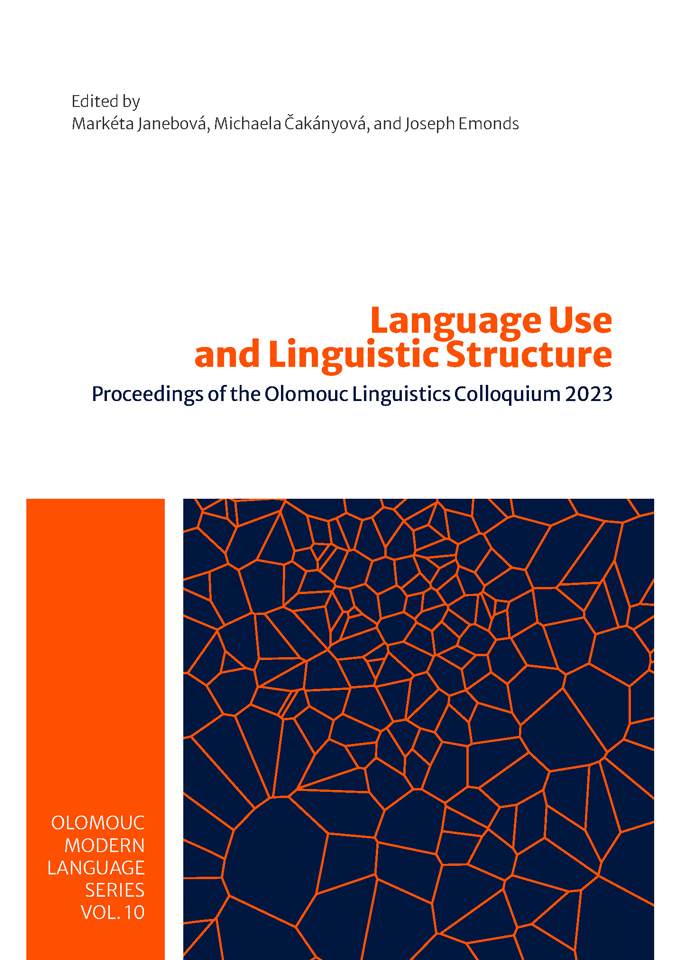Language Use and Linguistic Structure. Proceedings of the Olomouc Linguistic Colloquium 2023
Language Use and Linguistic Structure. Proceedings of the Olomouc Linguistic Colloquium 2023
Contributor(s): Markéta Janebová (Editor), Michaela Čakányová (Editor), Joseph Emonds (Editor)
Subject(s): Language and Literature Studies, Theoretical Linguistics, Applied Linguistics, Syntax, Semantics, Pragmatics, Sociolinguistics, Philology
Published by: Univerzita Palackého v Olomouci
Keywords: linguistics; general linguistics; morphology; syntax; semantics; pragmatics; phonology
Summary/Abstract: The latest volume of OLINCO proceedings is a selected set of sixteen papers that grew from presentations at OLINCO 2023 - the international Olomouc Linguistics Colloquium held at Palacký University in June 2021. The papers collected here are unified by the topic of the colloquium: Language Use and Linguistic Structure, in that they all, in one way or the other, address the central questions of the study of human language. They all use standard scientific methodology and theory and solidly researched empirical evidence in favor of formalized structural representations of the language system.
- E-ISBN-13: 978-80-244-6508-1
- Page Count: 242
- Publication Year: 2024
- Language: English
Deriving Rationale Clauses: Infinitives and Imperative
Deriving Rationale Clauses: Infinitives and Imperative
(Deriving Rationale Clauses: Infinitives and Imperative)
- Contributor(s):Irina Burukina (Editor)
- Language:English
- Subject(s):Philology
- Page Range:12-23
- No. of Pages:12
A Note on Verum Focus in Tigrinya
A Note on Verum Focus in Tigrinya
(A Note on Verum Focus in Tigrinya)
- Contributor(s):Gioia Cacchioli (Editor)
- Language:English
- Subject(s):Philology
- Page Range:24-41
- No. of Pages:18
Subjects of Verbs of Perception and Cognition in Czech
Subjects of Verbs of Perception and Cognition in Czech
(Subjects of Verbs of Perception and Cognition in Czech)
- Contributor(s):Michaela Čakányová (Editor)
- Language:English
- Subject(s):Philology
- Page Range:42-52
- No. of Pages:11
Universal Syntactic Features of Open Categories
Universal Syntactic Features of Open Categories
(Universal Syntactic Features of Open Categories)
- Contributor(s):Joseph Emley Emonds (Editor)
- Language:English
- Subject(s):Philology
- Page Range:53-63
- No. of Pages:11
Rethinking Null Expletives in Mandarin Chinese
Rethinking Null Expletives in Mandarin Chinese
(Rethinking Null Expletives in Mandarin Chinese)
- Contributor(s):Chang Liu (Editor)
- Language:English
- Subject(s):Philology
- Page Range:64-79
- No. of Pages:16
The Neutral Case System of English
The Neutral Case System of English
(The Neutral Case System of English)
- Contributor(s):Mark Newson (Editor), Krisztina Szécsényi (Editor)
- Language:English
- Subject(s):Philology
- Page Range:80-91
- No. of Pages:12
Split Inflection on Internominal Adjectives
Split Inflection on Internominal Adjectives
(Split Inflection on Internominal Adjectives)
- Contributor(s):Feras Saeed (Editor)
- Language:English
- Subject(s):Philology
- Page Range:92-108
- No. of Pages:17
The Case Morpho-syntax in Aromanian (Southern Albania): Descriptive and Theoretical Aspects
The Case Morpho-syntax in Aromanian (Southern Albania): Descriptive and Theoretical Aspects
(The Case Morpho-syntax in Aromanian (Southern Albania): Descriptive and Theoretical Aspects)
- Contributor(s):Leonardo M. Savoia (Editor), Benedetta Baldi (Editor)
- Language:English
- Subject(s):Philology
- Page Range:109-125
- No. of Pages:17
Few ≠ Not Many
Few ≠ Not Many
(Few ≠ Not Many)
- Contributor(s):Peter Hallman (Editor)
- Language:English
- Subject(s):Philology
- Page Range:127-137
- No. of Pages:11
Predicative and Argumental Demonstratives as Clausal Proforms in Hungarian
Predicative and Argumental Demonstratives as Clausal Proforms in Hungarian
(Predicative and Argumental Demonstratives as Clausal Proforms in Hungarian)
- Contributor(s):Péter Szűcs (Editor)
- Language:English
- Subject(s):Philology
- Page Range:138-150
- No. of Pages:13
Contrastive Uses Reconsidered: The Case of Hungarian Exophoric Demonstratives
Contrastive Uses Reconsidered: The Case of Hungarian Exophoric Demonstratives
(Contrastive Uses Reconsidered: The Case of Hungarian Exophoric Demonstratives)
- Contributor(s):Enikő Tóth (Editor), Péter Csatár (Editor)
- Language:English
- Subject(s):Philology
- Page Range:151-164
- No. of Pages:14
A Note on Speech Act Recursion
A Note on Speech Act Recursion
(A Note on Speech Act Recursion)
- Contributor(s):Tue Trinh (Editor)
- Language:English
- Subject(s):Philology
- Page Range:165-175
- No. of Pages:11
Word-Stress and the Minimal Word Constraint in English
Word-Stress and the Minimal Word Constraint in English
(Word-Stress and the Minimal Word Constraint in English)
- Contributor(s):Csaba Csides (Editor)
- Language:English
- Subject(s):Philology
- Page Range:177-192
- No. of Pages:16
The Distributive and Cumulative Readings Acquisition: Experimental Evidence from Czech
The Distributive and Cumulative Readings Acquisition: Experimental Evidence from Czech
(The Distributive and Cumulative Readings Acquisition:
Experimental Evidence from Czech)
- Contributor(s):Mojmír Dočekal (Editor), Žaneta Šulíková (Editor)
- Language:English
- Subject(s):Philology
- Page Range:193-209
- No. of Pages:17
Determining Argument Structure Variants by Numerical Optimization
Determining Argument Structure Variants by Numerical Optimization
(Determining Argument Structure Variants by Numerical Optimization)
- Contributor(s):Krisztina Szécsényi (Editor), Tibor Szécsényi (Editor)
- Language:English
- Subject(s):Philology
- Page Range:210-223
- No. of Pages:14
Distinguishing Compositional and Non-Compositional Verbal Complexes: A Corpus-Based Approach
Distinguishing Compositional and Non-Compositional Verbal Complexes: A Corpus-Based Approach
(Distinguishing Compositional and Non-Compositional Verbal Complexes: A Corpus-Based Approach)
- Contributor(s):Tibor Szécsényi (Editor), Livia Gyulai (Editor)
- Language:English
- Subject(s):Philology
- Page Range:224-237
- No. of Pages:14

